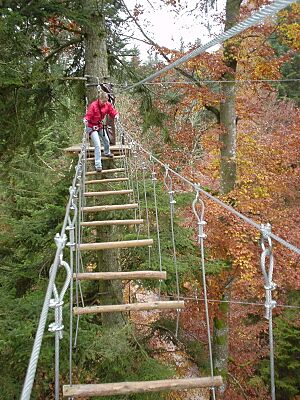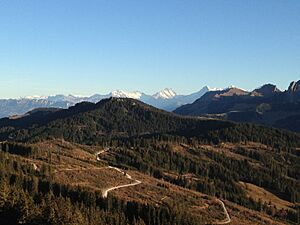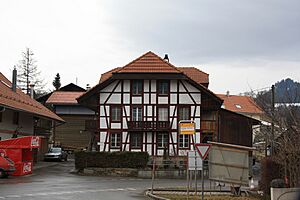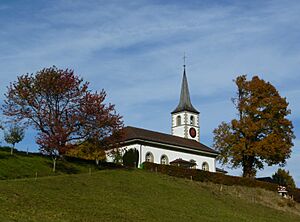Rüschegg facts for kids
Quick facts for kids
Rüschegg
|
||
|---|---|---|
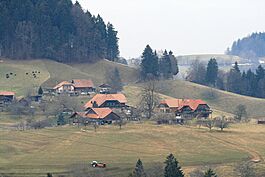 |
||
|
||
| Country | Switzerland | |
| Canton | Bern | |
| District | Bern-Mittelland | |
| Area | ||
| • Total | 57.3 km2 (22.1 sq mi) | |
| Elevation | 890 m (2,920 ft) | |
| Population
(Dec 2020 )
|
||
| • Total | 1,697 | |
| • Density | 29.62/km2 (76.71/sq mi) | |
| Postal code |
3153, 3154
|
|
| Surrounded by | Därstetten, Guggisberg, Oberwil im Simmental, Rüeggisberg, Rüti bei Riggisberg, Wahlern | |
Rüschegg is a special kind of town, called a municipality, located in the Bern-Mittelland area in the region of Bern in Switzerland. It is also a Swiss Reformed Church parish, which means it has its own church and religious community.
Contents
Exploring Rüschegg's Past
Rüschegg was first mentioned a long time ago, between 1417 and 1428, and was known as Ruesseg. For many years, until 1860, Rüschegg was actually part of another town called Guggisberg.
The main church in Rüschegg was built in 1813. In 1860, Rüschegg became its own independent municipality. This also meant it became its own parish, with its own church leaders.
For a while, until the early 1900s, Rüschegg was known as the poorest municipality in the Bern region. This means many people there struggled financially. But with help from the government and a rise in tourism, the local economy got better.
Today, Rüschegg has hotels, hiking trails, and ski slopes for visitors. There's even a fun ropes course in a small area called Längeneybad. However, in 2000, most working people from Rüschegg traveled to jobs in Bern and nearby cities.
Discovering Rüschegg's Geography
Rüschegg covers an area of about 57.4 square kilometers (22.2 square miles). A big part of this land, about 41.6%, is used for farming. Forests cover almost half of the area, about 49.8%.
A smaller part, about 3.0%, has buildings and roads. Rivers and lakes make up about 1.5% of the land. The remaining 4.4% is land that cannot be used for farming or building, like rocky areas.
Rüschegg is located in the Alpenvorland, which is an area before the Alps. It sits between the Schwarzwassergraben (a valley at 714 meters or 2,343 feet high) and the Ochsen peak (a mountain at 2,188 meters or 7,178 feet high). The Ochsen, Bürglen (2,165 meters or 7,103 feet), and Gantrisch (2,175 meters or 7,136 feet) mountains form the southern border of the municipality.
Rüschegg includes several smaller villages like Heubach, Hirschhorn, Gambach, and Graben. It shares borders with other municipalities such as Rüeggisberg, Rüti bei Riggisberg, Därstetten, Oberwil im Simmental, Guggisberg, and Wahlern.
In 2010, Rüschegg became part of a new administrative area called Verwaltungskreis Bern-Mittelland.
Rüschegg's Coat of Arms
The blazon (description) of Rüschegg's coat of arms is: Or a Lion Paw Sable issuant from chief sinister holding a Fir Tree Vert trunked and eradicated Gules. This means it shows a black lion's paw coming from the top left, holding a green fir tree with a red trunk.
Understanding Rüschegg's Population
As of December 2011, Rüschegg had a population of 1,655 people. A small part of the population, about 3.3%, were people from other countries. Between 2010 and 2011, the population changed slightly, mostly due to people moving away.
Most people in Rüschegg (about 97.4%) speak German as their main language. A small number of people also speak English or Albanian.
In 2008, the population was almost evenly split between males (49.3%) and females (50.7%). Most residents were Swiss citizens.
About 43.9% of the people living in Rüschegg in 2000 were born there. Many others were born in the same region (canton) of Bern. About 10.9% were born elsewhere in Switzerland, and 5.7% were born outside of Switzerland.
In 2011, young people (0–19 years old) made up 19.2% of the population. Adults (20–64 years old) were 61.3%, and seniors (over 64 years old) were 19.5%.
The number of people living in Rüschegg has changed over time. You can see this in the chart below:

Rüschegg's Economy and Jobs
In 2011, Rüschegg had a low unemployment rate of 1.3%. This means most people who wanted to work had jobs. In 2008, there were 409 people working in the municipality.
Jobs are often grouped into three main types:
- Primary sector: This includes jobs like farming and forestry. In 2008, 164 people worked in this sector, with 68 businesses.
- Secondary sector: This includes jobs like manufacturing and construction. 52 people worked here, with 17 businesses.
- Tertiary sector: This includes jobs in services, like shops, hotels, and healthcare. 193 people worked in this sector, with 38 businesses.
Many people who live in Rüschegg also work there. In 2000, 280 workers lived and worked in the municipality. However, more people left Rüschegg for work than came into it. About 13.7% of workers used public transportation, while 63.6% used a private car to get to work.
Religion in Rüschegg
According to the 2000 census, most people in Rüschegg (78.4%) belonged to the Swiss Reformed Church. About 6.2% were Roman Catholic.
There were also people who belonged to other Christian churches. A small number of people were Muslim. About 6.45% of the population did not belong to any church or had no specific religion.
Education in Rüschegg
In Rüschegg, about 56.8% of adults have finished high school (called non-mandatory upper secondary education). About 13.5% have gone on to higher education, like university or a specialized college.
The school system in the Bern region starts with one year of optional Kindergarten. After that, students attend six years of Primary school. Then, they go to three years of lower Secondary school, where they are grouped based on their skills. After lower Secondary, students can continue their education or start an apprenticeship (learning a trade on the job).
During the 2011-2012 school year, 120 students attended schools in Rüschegg. There was one kindergarten class with 22 students. The municipality had four primary classes with 75 students. There were also two lower secondary classes with 23 students.
In 2000, most students (191) lived and went to school in Rüschegg. However, 21 students came from other towns to attend school in Rüschegg, and 92 residents went to schools outside the municipality.
See also
 In Spanish: Rüschegg para niños
In Spanish: Rüschegg para niños
 | Victor J. Glover |
 | Yvonne Cagle |
 | Jeanette Epps |
 | Bernard A. Harris Jr. |





